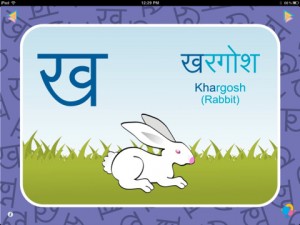By Priya Desai, guest blogger, @priyauthor & online: www.priyadesai.co.uk
 Learning another language is like becoming another person. – Haruki Murakami
Learning another language is like becoming another person. – Haruki Murakami
As bilinguals or even trilinguals, we can so appreciate this quote.
A language is more than words – a language gives us greater means to communicate with people of a different culture; and also appreciate and learn about a culture. This, as Haruki Murakami so rightly states, allows us to become another person.
Being Asians and growing up in a Western society, we naturally have an appreciation of this other person, which is defined by our use of language, followed by specific customs and traditions. It’s possible; as I’m sure we have each discovered in our own ways, that we can find the perfect balance between the East and West of us. In the same way, there are certain things we can do, to help the next generation establish some sort of balance too, namely with their developing language skills and sense of other person – it all starts with language use at home.
Here are some tips to guide you in supporting your child, or children in becoming successful bilinguals:
- Consistency in how you communicate should be your main priority.
I often recommend to parents specific times are chosen to speak the home language, and specific times to speak English. For example, family time or meal times could be home language times and at all other times English could be spoken. Or you may like it to be the opposite, depending on the age of your child or your language preferences.

stock photo
You can also try the one parent – one child model of communication, in which one parent consistently speaks in the home language and the other parent consistently speaks in English. You will however, need to agree on which language is spoken during family times.
- In maintaining consistency, do not mix two languages in one sentence. For example, speak in Hindi then add an English word. Neither should you speak Hindi for one sentence, and then switch to English. This will only make language learning harder for a young child. Children need to be taught in a structured manner, this will help them associate specific words, sentence structures and word order to a specific language.
- It is natural for bilingual children to stop speaking the home language or speak it less, when they start school. This is when it can become hard to maintain the home language and also encourage your child to keep using and learning your home language. Remember to be consistent – speak your home language at specific times consistently and English at other times. Make it a part of your routine.
When a child reaches school age, I often recommend to parents that English is spoken and reinforced at home to support school work, and the home language is spoken consistently during meal times for example.
- If your child stars to speak your home language less often, don’t be concerned that he/she will lose all their home language skills, as they will already have had the initial necessary exposure. In these situations, a child becomes what’s known as a receptive language learner, in that they may continue to follow and understand the home language but choose not to speak it consistently.
 Here’s something to consider: being able to understand the home language will only be of benefit in the future when a child does choose to speak the home language more often, or it is necessary to. So not speaking the home language is not the worst outcome.
Here’s something to consider: being able to understand the home language will only be of benefit in the future when a child does choose to speak the home language more often, or it is necessary to. So not speaking the home language is not the worst outcome.
- Being a Speech and Language Therapist (Speech and Language Pathologist in the US/Canada), I must also add that if you find your child is a late talker and appears to be finding it hard to learn both languages, it may be necessary to consult a Speech and Language Pathologist to ascertain if learning language is an area of weakness; and if your child is in need of additional language support.
Children naturally pick up and absorb information from their home environment. In recognising our different language use and the when of what language we are using, we are already on the road to becoming more consistent in our own use of language. And we will therefore, be able to provide our children with the most suitable language models, which will enable them to pick up language optimally; and hence help them find the other person that is innately in them.
More About Priya Desai

Priya Desai is a private Speech and Language Therapist and Children’s Author based in London. You can follow Priya on Twitter @priyaauthor and find out more information about her work at www.priyadesai.co.uk



I’m trying to learn Hindi specifically because I want to give my children the gift of being bilingual. 🙂
Thank you for this article! My husband and I are both first generation Indian American, though I am the only one who speaks Hindi. I do speak Hindi to my son who is now 18 months old when we are alone together. I would like him to at least be able to understand. If my Hindi vocabulary is quite elementary, and he’s not consistently hearing it from others, am I inadvertently limiting his English vocabulary development?
Regarding your last bullet point, at what age would I Be concerned that he is a late talker and finding difficulty in learning both languages?
I welcome your advice via this page or to the email address I provided. Thank you!!
(Apologies for the duplicate post. I had forgotten to subscribe to comments.)
[…] http://masalamommas.com/2013/06/10/getting-kids-to-become-bilingual/ […]
[…] http://masalamommas.com/2013/06/10/getting-kids-to-become-bilingual/ […]